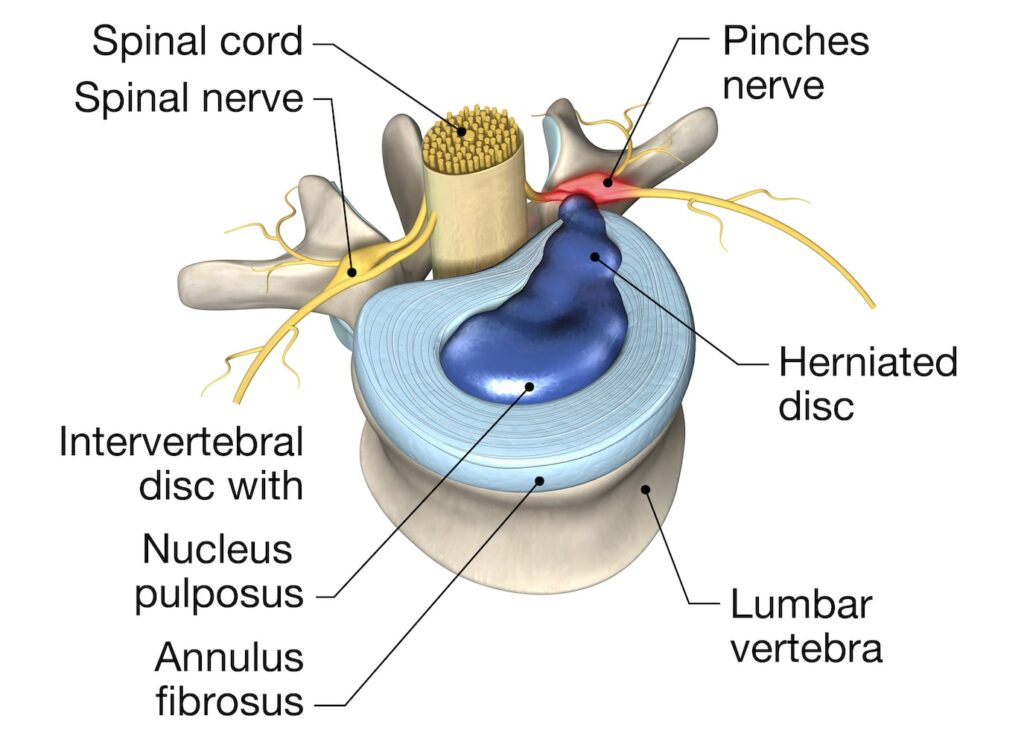A slipped disc, also known as a herniated disc, refers to an occurrence where the soft tissue cushion (i.e. the intervertebral disc) located between 2 spinal vertebral bones gets pushed out into the spinal canal. A slipped disc may be extremely painful as nerves within the spine get compressed. One may also experience numbness and tingling in their shoulders, back, limbs and feet.
Contrary to popular belief, slipped discs do not just happen to the elderly or in those with poor posture. In fact, it can often occur among young adults and even those who are active and exercise regularly. However, it is true that as you age, your likelihood of experiencing slipped disc increases. This is caused by your discs losing protective water content as you age, causing them to slip out of place more easily.
The outer ring of the disc could become weak or torn, causing the inner portion to slip out. The main causes of a slipped disc include:

Pain from slipped discs may be very debilitating, and may impair day-to-day life as even very small actions may result in severe pain. Numbness and incontinence may also be very uncomfortable for many patients as the symptoms are often marked and severe.
Diagnosing a muscle strain from a slipped disc may be challenging to a doctor at first glance. As such, slipped discs are often diagnosed based on a clinical history, physical examination, as well as scans such as an MRI scan, CT scan, or an x-ray of the spine. To study which nerves are affected, a nerve conduction study may also be conducted.
Recommended treatments are highly dependent on the severity of your condition. Sometimes, injection therapy is recommended to manage your symptoms. A physiotherapist could also help correct your posture, strengthen your back muscles and improve flexibility. Preventive measures are also important to reduce the risk of further injuries, and these include minimising heavy lifting, getting enough rest, and losing weight.
However, if symptoms persist or your condition does not improve, surgery may be recommended. This involves alleviating the pressure on the nerves by addressing the cause of the nerve compression and can be done via minimally invasive techniques.

When it comes to slipped discs, it is important to consult your doctor as soon as possible, especially if you experience severe pain or discomfort. This helps to minimise further damage to the spine and ensures faster recovery via early treatment.
Painkillers such as Non-steroidal anti-inflammatory drugs (NSAIDs) may be very helpful in reducing pain. Getting enough rest and using heat packs/cold packs may also be very helpful. However, this only provides temporary relief and does not address the root cause of the issue.
Physiotherapy exercises are typically the best — these include exercises to strengthen and stabilise the back, spinal muscles, and core. Exercises that help to increase flexibility, posture, and stability of the spine are also very useful.
Most people recover in about 6 weeks without surgical treatment.
One key way to prevent slipped discs includes employing the correct methods to lift objects, keeping the back strong and active, and maintaining a healthy weight and lifestyle.
Usually, a slipped disc can heal on its own. However, there are instances where the herniated disc puts significant strain on the nerve, which could cause nerve damage, loss of sensation or even loss of bowel control. Your doctor will advise you on whether conservative measures such as rest and OTC painkillers will suffice.
It is possible to pop a slipped disc back into place. However, you are advised against this as it is difficult and may worsen your current condition.
Herniated discs with symptoms can worsen, becoming more painful and debilitating over time. You may also experience bladder and bowel dysfunction.
Every year, up to 2% of people experience back pain caused by a slipped disc.
Sitting for prolonged periods of time could put more stress on the discs of your spine, worsening the pain. Moving around regularly or standing from your seat will help alleviate the pressure.
Certain massages could worsen your condition. Check in with your physiotherapist because there are massage therapies that could help release tightness in the muscles caused by the nerve compression.
Contact Us For More Information
We provide quality specialised care for neuro and spine conditions.
For enquiries, leave a message and our friendly team will get in touch with you.
Monday – Friday: 9:00AM – 5:00PM
Saturday: 9:00AM – 12:30PM
Sunday & Public Holiday: Closed
We provide quality specialised care for neuro and spine conditions.
For enquiries, leave a message and our friendly team will get in touch with you.
Monday – Friday: 9:00AM – 5:00PM
Saturday: 9:00AM – 12:30PM
Sunday & Public Holiday: Closed
We provide quality specialised care for neuro and spine conditions.
For enquiries, leave a message and our friendly team will get in
touch with you.
Monday – Friday: 9AM – 1PM | 2PM – 5PM
Weekends & Public Holidays: CLOSED
© 2023 All Rights Reserved | Advanced Brain & Spine Surgical Centre | Terms & Conditions